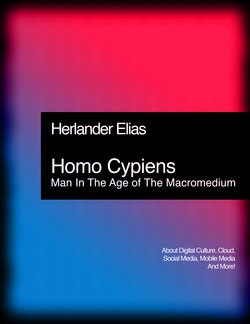Читать книгу Homo Cypiens - Herlander Elias - Страница 11
На сайте Литреса книга снята с продажи.
8. Surveillance Capitalism
ОглавлениеWe have never heard of surveillance as much as now. We are being radiographed by large-scale digital media. The keyboards of our smartphones and our computers are no longer ours. What we type and write is systematized on big data platforms. Intelligent algorithms evaluate our performances in an age when we are all actors in a gibsonian network of massive dynamics. This is called “surveillance capitalism”. What we see, download, consult and share, with whom we socialize and with whom we work is all digitized. Once again, there is no more “out of the system”. Our imagery is anticipated by machines of the new industrial revolution, and so many revolutions have been lost for good. All information about the present and the past, as well about future plans, everything is recorded in digital. But even if it is as the old proverb “Out of debt, out of danger”, the question is more about what our information allows to constitute in the name of our protection. And for now, what we do with our information is that better products and services are produced or terrorists are caught in the interstitial meshes of the system. This surveillance capitalism anticipates us. Somewhere in the cloud the machines try to gauge who the “hateful” and who the fans are. It's almost a binary system. It happens in popular culture and in the cosplay that there are people who form communities due to common tastes and references, but the network is also full of others that are united by hatred of ethnicities, social classes, politics and even countries. We are in a binary age in which one can be a fan and a star, or an anti-hero and a terrorist. There seems to be no middle ground in the media except to be consumer, spectator, or user. This age is one in which we all find ourselves in the same places, that is, in the applications of social media. Social networks are the new cathedrals and TV screens. That's why people are so easily surveilled. The very people, as Bauman well points out in his text on “liquid modernity”, confess their whole life online. Intriguingly, people tell all about themselves on social networks, which Bauman had already identified as the “default address” for these new generations. Note that we are all (since Samsung promoted the self-photographing format in selfies at the Hollywood Oscars delivery ceremony) to self-photograph ourselves, fulfilling Orwell's fears; it is ourselves that we are watching and making ourselves public through smartphones that are basically cameras to shoot and take photos disguised as mobile phones. We opened, not the “pandora box”, but instead the “pandora camera”. Since everything we share gets registered on the magnanimous servers of the cloud, we happen to be on the wrong side of the equation at this stage of surveillance capitalism. Now we only have the terminals. The true apparatus lies in a safe and remote place. Everything is safe. We're online, and that's what most audiences / users seem to be interested in. Once in this state, what happens is that whenever we shoot or take photos we are opening ourselves to the world. Each smartphone user is his or her own Foucault, Orwell and Warhol. We are always in direct digital media. And even if we can leave, we're online through wireless connections.
Nikola Tesla's dream about the electric car is now consumed in the present. But the most pressing thing is that we have wireless communication links. This capitalism monitors us through the air, crosses walls, crosses borders and globalizes brands and institutions with a very peculiar signature. We're just in the middle. So, there is only medium, media, digital media, and it is called “media-environment” in contrast to the first environment we left behind in the original, remote and beautiful African savannas. Interestingly, Marshall McLuhan, in the 1960s, spoke about computer expansion and the so-called “electric environment”. If we add to this Manuel Castells’ idea that the “information society” had merged with capitalism, we can infer that the new capitalism of surveillance is a byproduct of the fusion between technology, media and capital. The “pandora camera” was opened, and now no one is safe because images and financial history produce our new I, an I star, capitalizable and digitized forever and ever.
